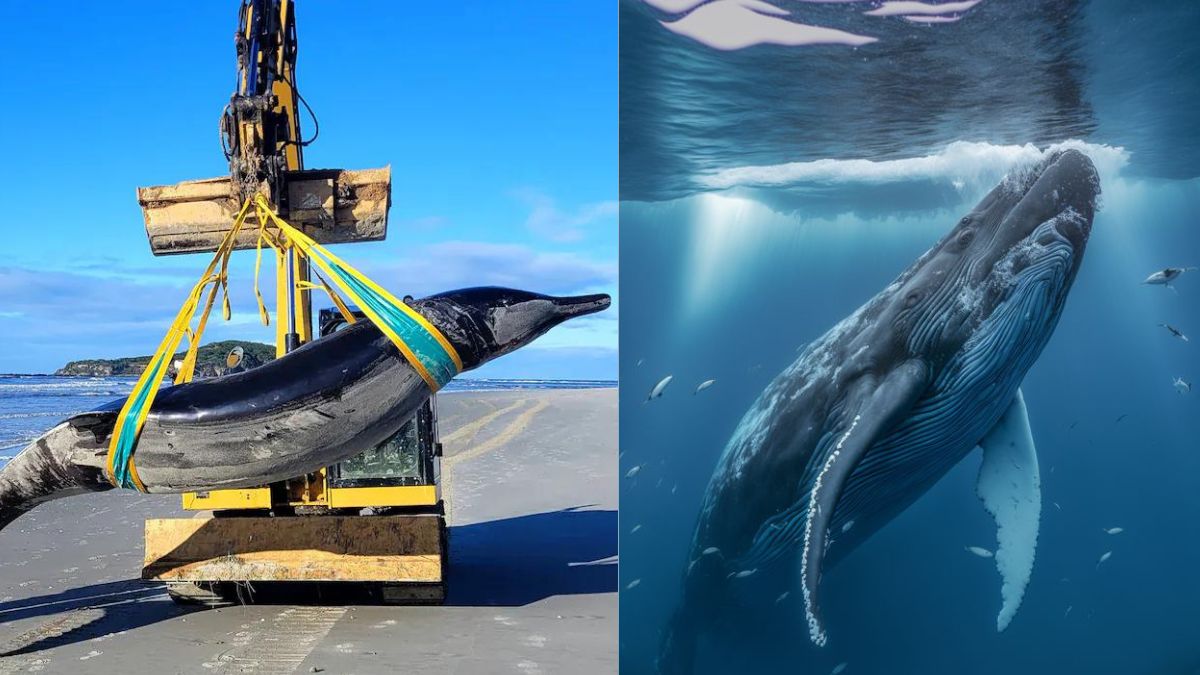World Rarest Whale Washes Up on New Zealand Beach: In an extraordinary turn of events, the world’s rarest whale has washed up on a beach in New Zealand, captivating marine biologists and whale enthusiasts alike. This discovery not only brings attention to the delicate state of marine biodiversity but also underscores the critical importance of conservation efforts.
The Arrival of the World Rarest Whale
On a serene morning in New Zealand, local beachgoers stumbled upon a sight that was both awe-inspiring and somber: the lifeless body of a whale, unlike any they had seen before. Marine biologists were swiftly called to the scene, and after thorough examination, they identified the cetacean as the elusive spade-toothed whale (Mesoplodon traversii).
The spade-toothed whale is an enigmatic and rarely seen member of the beaked whale family. First described in 1872, this species remained a mystery for over a century, known only from a few fragmented bones. It wasn’t until 2010 that the first complete specimens were identified, making the recent New Zealand find a landmark event in marine biology.
Spade-toothed whales are distinguished by their unique physical characteristics. They possess elongated beaks, slender bodies, and distinctively shaped teeth, from which their name derives. These whales typically inhabit deep, offshore waters, making sightings exceptionally rare. Their preference for remote oceanic regions further complicates efforts to study and understand their behaviors and population dynamics.
Ingrid Andress National Anthem at the 2024 Home Run Derby: A Detailed Examination
The International Union for Conservation of Nature (IUCN) classifies the spade-toothed whale as “Data Deficient,” reflecting the scarcity of information available about this species. The recent beaching incident offers a rare opportunity for scientists to gather data and potentially re-evaluate their conservation status. The data gleaned from this whale could provide critical insights into their distribution, health, and the threats they face.
Threats to Survival
Despite the limited data, it is believed that spade-toothed whales face numerous threats, similar to those affecting other marine mammals. These include:
- Climate Change: Alterations in sea temperature and currents can disrupt their migratory patterns and prey availability.
- Pollution: Marine debris, including plastic waste, poses significant risks, as ingestion or entanglement can be fatal.
- Ship Strikes: Increased maritime traffic raises the likelihood of collisions, often resulting in serious injury or death.
The recent discovery underscores the urgent need for enhanced conservation measures. Protecting the habitats of spade-toothed whales and mitigating human-induced threats are critical steps towards ensuring their survival. Future research efforts should focus on:
- Satellite Tracking: Implementing satellite tagging to monitor their movements and habitat use.
- Acoustic Monitoring: Using underwater microphones to study their vocalizations and communication patterns.
- Genetic Studies: Analyzing DNA to understand their genetic diversity and population structure.
The beaching of the world’s rarest whale is more than a local event; it holds global significance. It highlights the fragility of marine ecosystems and the interconnectedness of species within them. Each discovery adds a piece to the puzzle of marine biodiversity, helping scientists to understand and protect the intricate web of life in our oceans.
Public awareness and education are vital components of conservation. By sharing the story of the spade-toothed whale, we can foster a greater appreciation for marine life and the urgent need to protect it. Educational programs, documentaries, and media coverage play a crucial role in bringing these issues to the forefront of public consciousness.
Conservation is a global responsibility. International cooperation among governments, NGOs, and research institutions is essential to developing and implementing effective conservation strategies. The spade-toothed whale’s plight serves as a reminder that collective action is necessary to address the myriad challenges facing marine life today.
Conclusion: World Rarest Whale Washes Up on New Zealand Beach
The unexpected appearance of the world’s rarest whale on a New Zealand beach is a poignant reminder of the wonders and vulnerabilities of our marine world. It calls us to action—to protect, study, and cherish these magnificent creatures before it is too late. As we strive to learn more about the spade-toothed whale, let this discovery inspire a renewed commitment to marine conservation, ensuring that future generations inherit a vibrant and thriving ocean ecosystem.
Also Read:
Will Ferrell Reveals Childhood Embarrassment Over His Real Name on MeSsy Podcast
